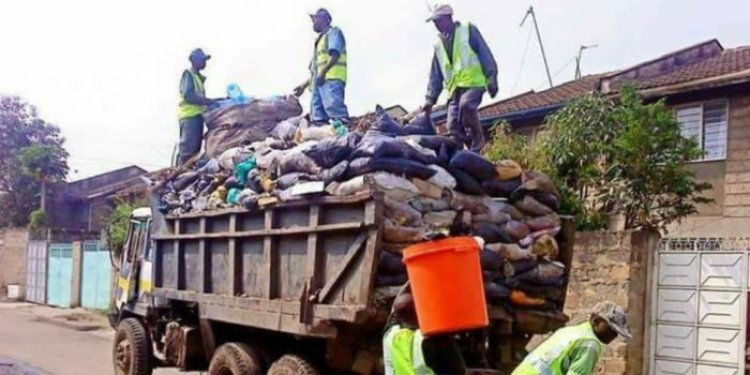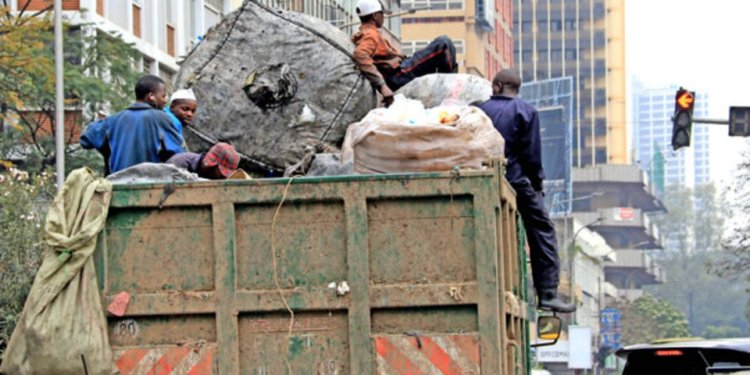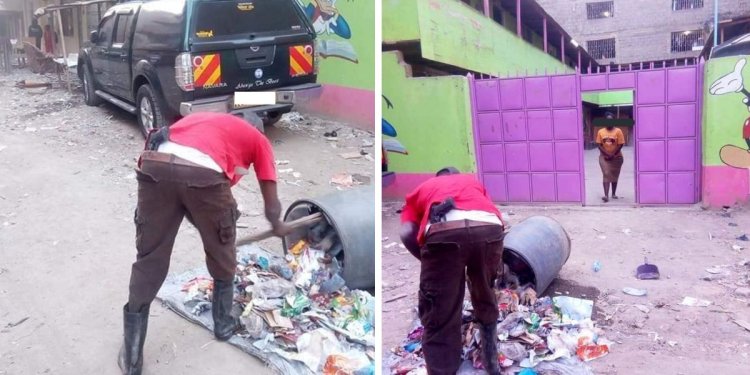Why Nairobi Garbage Collectors Are Beating Up Residents Who Don't Pay Fees
They further termed the collector as a known thief who has been chased out of several residences in the area

A section of Nairobi residents on Saturday, May 6 sounded an alarm regarding garbage collectors accosting them on their way home over failure to pay them monthly collection fees.
Speaking to Viral Tea, a resident in Mathare North on condition of anonymity lamented that he was a victim of such attacks after failing to remit collection fees to the garbage collectors on multiple occasions.
He revealed that he was targeted by one of the collectors in the company of goons who tailed him to his residence and attacked him at around 11.00 pm and managed to gain access to the residence, causing a commotion in the process.
He added that they searched his pockets, including a Ksh100 note which the collector took away, but got it back in the midst of the scuffle which drew the attention of other residents.

A garbage truck in Nairobi CBD. /DAILY NATION
His narrative was backed up by residents who opened up on his little-known lifestyle and how he and his comrades go to extreme lengths to fund it. One of them noted that the collectors often keep the fees amongst themselves and spend it on recreational substances including indulgence in alcohol and muguka (khat).
"When they don't have it, they start getting desperate and will do anything. That's why you should be careful of them and not get cross with them," noted a resident to Viral Tea.
They further termed the collector as a known thief who has been chased out of several residences in the area as he is known for going door to door and asking for monthly collection fees while spying on the residences and at times, being linked to break-ins and robberies, further accusing the landlord of failing to take action against him.
Robbers Disguised As Garbage Collectors
Past reports from the Directorate of Criminal Investigations (DCI) showed how thugs were arrested or shot dead by police officers while defying orders to surrender and found that many of the recent cases are being reported within residential areas, more than within major cities themselves.
Simply put, the likelihood of being robbed from your own house is higher during the day than at night in a section of Nairobi estates, especially those infamous for harbouring dangerous criminals.
Many times, the thugs pounce on unsuspecting Kenyans while going about their daily activities, such as running to the shop to buy a basic item.
For instance, you might have forgotten to buy something or you realize that your cooking oil ran out when you are about to cook. Somewhere on your way to the shop, someone threatens you with a knife or a bonoko (fake gun) and asks you to surrender your phone or any other valuable, leaving you wondering if someone had been waiting for you to leave the house.
In an estate, the following people know a residence best: a caretaker, a security guard (in some estates) and a garbage collector. It is the latter that is a preferred role for robbers while other suspects collude with caretakers to break into homes.
A majority of estates in Nairobi have specific days when garbage is collected, from Monday to Sunday, for example, collectors could be in Buruburu today, Kilimani tomorrow and Ruaraka the next day. A racket of criminals takes note of this and ensures that they are in your estate when the collectors come.
The shocking bit is that most of the robberies take place in the afternoons, when a lot of residents are away from home, between 12 pm and 3 pm. As Viral Tea discovered, this is also the same time garbage is collected in the area, leading to suspicion that the collectors could be the culprits.
In 2019, Kenyans On Twitter (KOT) raised an alarm about a garbage collector who was going about his duties with a gun strapped on his behind in a photo that was taken in secret and shared on Twitter, which went viral, attracting the DCI's attention.
The man was donning a red t-shirt from a telco company, wearing a rosary amongst several chains on his neck and a brown trouser collecting garbage, but his rearview was trotting a gun.
In 2017, residents of Roysambu in Nairobi, which is mostly inhabited by middle-class earners and students from the surrounding universities, who are often away during the day, expressed concern regarding the rate at which their houses are being broken into.

A man who was photographed in February 2019 collecting garbage with a gun on his rearview. /TWITTER.DCI
One of the residents claimed he was in school when he got a phone call from his caretaker asking him to urgently go back home. When he got to his house, he was met by a broken padlock and a vandalised house and subsequently lost a tablet, mobile phone and a laptop.
Nairobi's Losses To Garbage Collection Gangs
A report released in 2021 by Global Initiative Against Transnational Organised Crime (GI-TOC) revealed how Nairobi’s waste management sector is rife with corruption and continues to be infiltrated by criminal gangs.
It stated that all stages of the waste processing including the award of contracts, collection of waste from households and dumping of waste at the Dandora dumpsite are infiltrated by corruption, with a huge chunk of the business controlled by criminal gangs.
“Procurement in the waste-management sector is fraught with so many irregularities. And this has been going on for decades on end, and keeps defying every change in the leadership at City Hall,” the report stated in part.
The GI-TOC report further noted that fraud and lack of oversight that accompanies the criminalisation of the waste-management sector are so severe that Nairobi County does not know how much rubbish it actually produces with some saying it is 2,500 tonnes of rubbish per day while others say it is 3,500 tonnes.
“The level of procurement irregularity such as double-invoicing, and the proliferation of illegal and unofficial dumpsites, the dysfunctional weighbridge and the fines levied by gangs make exact estimates nearly impossible,” it explained.

 admin
admin 




